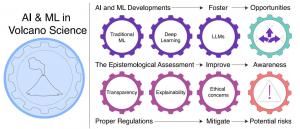Researchers from Perugia University describe how AI can unveil the secrets of eruptions
GA, UNITED STATES, September 29, 2025 /EINPresswire.com/ -- The article examines how machine learning is revolutionizing igneous petrology and volcanology by automating tasks, enhancing models, and accelerating discoveries. At the same time, the authors warn of key challenges, including the need to understand what models actually learn and to ensure transparency, reproducibility, and interpretability. These concerns are especially critical for volcanic hazard assessment and crisis management. The study also addresses ethical risks and reviews evolving policies in the EU, US, and China.
Volcanoes are among the most powerful natural hazards on Earth, yet predicting their behavior remains one of the biggest scientific challenges. A new article published in Artificial Intelligence in Geosciences explores how machine learning (ML) can accelerate discoveries in volcano science, while also warning of potential pitfalls if ML is used without critical reflection.
The study, conducted by a duo of researchers from the University of Perugia, involved the analysis of current and emerging applications of artificial intelligence in volcanology.
“While ML tools can process massive amounts of seismic, geochemical, and satellite data far faster than traditional methods, opening up opportunities for earlier hazard detection and improved risk communication — it is not a silver bullet, says corresponding author Maurizio Petrelli. “We need to be aware of what models really learn and why transparency, reproducibility, and interpretability matter when decisions affect public safety in hazard assessment and crisis management.”
“AI can help us see volcanic systems in new ways, but it must be used responsibly,” says co-author Mónica Ágreda-López. “Our goal is not only to show both the opportunities and the risks but also to promote the understanding behind these tools, so that volcano science can benefit from machine learning without losing rigor and transparency.”
The authors call for careful epistemological evaluation, asking not just what AI can do, but how its methods align with scientific reasoning and the needs of society. The duo also stressed that building trust between AI developers, geoscientists, and at-risk communities is key to harnessing these technologies responsibly.
“Interdisciplinary collaborations and open data practices are essential steps to ensure AI contributes to safer, more resilient societies living with volcano hazards. We also need to consider ethics and evolving policies across the EU, China, and the US,” adds Ágreda-López.
Original Source URL
https://doi.org/10.1016/j.aiig.2025.100153
Funding information
The authors acknowledge the financial support for “Exploring uncharted realms of volcanic eruptions using experimental petrology and ground deformation data (VOLC-LAPSE)” project, under the National Recovery and Resilience Plan (NRRP), Mission 4, Component 2, Investment 1.3, Call for tender No. 341 published on 15.03.2022 by the Italian Ministry of University and Research (MUR), funded by the European Union – NextGenerationEU– Project Title “Multi-Risk sciEnce for resilienT commUnities undeR a changiNg climate - RETURN” – CUP H93C22000610002 - Grant Assignment Decree No. n. 1522 adopted on 11/10/2022 by the Italian Ministry of University and Research (MUR). MP acknowledges the PRIN (2022MS9KWR) project “Consolidating the radiocarbon calibration over the 12–40 ka interval using paired 14C and 40Ar/39Ar dating of Mediterranean tephra (COMET)”.
Lucy Wang
BioDesign Research
email us here
Legal Disclaimer:
EIN Presswire provides this news content "as is" without warranty of any kind. We do not accept any responsibility or liability for the accuracy, content, images, videos, licenses, completeness, legality, or reliability of the information contained in this article. If you have any complaints or copyright issues related to this article, kindly contact the author above.

